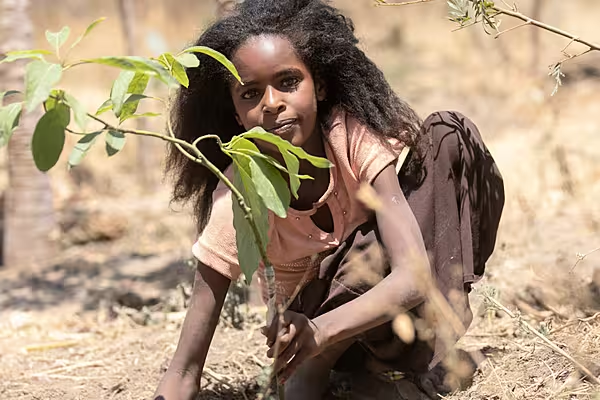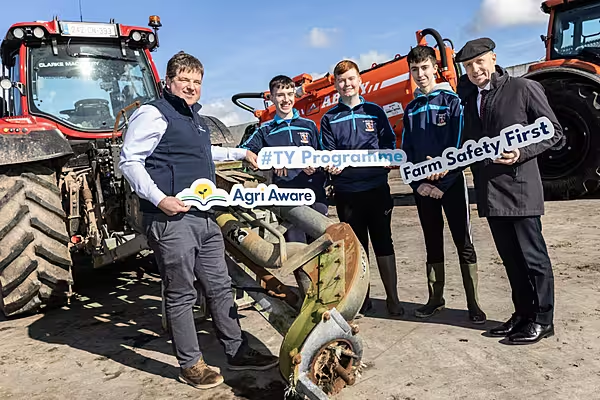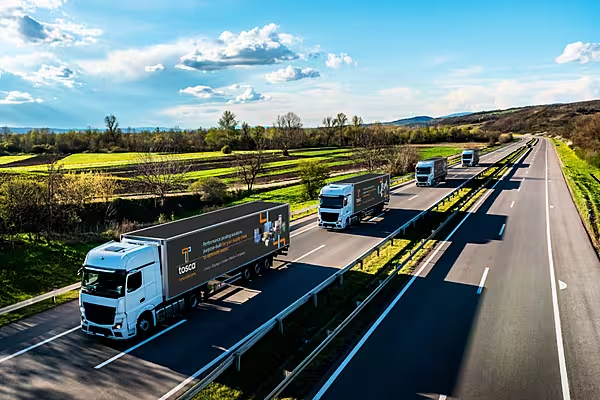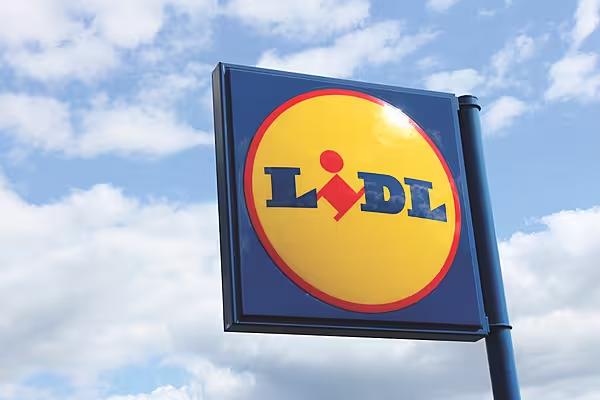Small and medium sized companies across Ireland are being invited to join a development charity in planting a million new trees in Ireland and in Africa while offsetting their carbon footprint.
Self Help Africa is seeking support from retailers, small manufacturers and other businesses for the scheme, which provides companies with the chance to sequester the carbon they generate by planting trees.
The initiative, announced to celebrate Earth Day on 22 April, will see trees being planted that could remove more than 20 million tonnes of carbon from the atmosphere every year for decades to come.
It follows the hugely successful One Million Trees campaign that saw the Irish charity plant a million trees in Africa and a further 100,000 new native trees at home in Ireland last year, supported by premium yogurt brand Glenisk.
In this new initiative, Self Help Africa will work with businesses to calculate carbon consumption, based on utility bills and other information provided.
The organisation will then provide firms with an estimate of the number of trees needed to plant for offsetting purposes, and a plan to meet these carbon targets by planting trees in Ireland and in Africa.
Tree Planting Isn’t Expensive
Tree planting as a means of carbon sequestration isn’t expensive. Self Help Africa calculates that each tree planted, once mature, will remove approximately 25kg of carbon from the atmosphere every year, and the total cost for a small business of offsetting its total carbon footprint can be as little as a few hundred euro a year.
“The campaign provides Irish companies with the chance to not just offset their carbon footprint, as their investment in trees will also benefit rural poor households in Africa,” says Self Help Africa’s head of business development, Martha Hourican.
“For a development charity working in agriculture, tree planting has always played an important part in our work, as trees are a key part of the mix of activities on small farms, where they provide a source of food, income and much more.”
Trees in Africa are also being planted in large-scale land rehabilitation projects, to arrest soil erosion, and as sources of shade and shelter. Recent planting activities have taken place in Uganda, Kenya, Ethiopia, Malawi and Burkina Faso.
Taking The Final Step
“A tree that is planted anywhere will benefit people everywhere,” says Martha.
“The fact that we are planting trees in sub-Saharan Africa, where rural communities who are least responsible for climate change are feeling some of its worst effects, makes this proposition even more attractive to business owners.
While Irish businesses were already doing a huge amount to reduce carbon production, by reducing waste and recycling and by choosing green energy options, planting trees can allow companies to go that final step.”
The organisation has partnered with Irish-led start-up GreenFeet, which provides consultancy services to businesses seeking to devise more comprehensive sustainability strategies.
GreenFeet’s easy to use app allows corporate clients to quickly calculate their carbon usage, and reduce their carbon emissions.
Companies who participate in Self Help Africa’s One Million Trees initiative receive certificates and other collateral to promote the partnership, and will also receive GPS coordinates that allow them to track where their trees have been planted in Africa and share the information with their customers and clients online.
Centra and Wholesome Kitchen
Business owner Eamonn Victory of Centra in Dunleer, Co Louth, has signed up to offset the carbon that is generated by his grocery business.
“I started to look at the energy that my business was consuming and loved the idea of doing something that would allow Victory’s Centra to become carbon neutral,” he says. “A little bit of research told me that planting trees was the most effective answer.”
While he is also reducing, recycling and sourcing sustainable energy at his retail business, Eamonn says that he is delighted to lend his backing to Self Help Africa’s One Million Trees campaign, and he is looking forward to planting thousands of trees with the organisation in the year ahead, all for just €34 to his business per month.
Based on energy bills and other information, Self Help Africa has estimated Eamonn’s carbon footprint, and has calculated the number of trees to be planted to render his Dunleer business carbon neutral or even negative.
In Mullingar, husband and wife team Denise Buckley and David Quirke of Wholesome Kitchen are also offsetting their carbon footprint by planting trees in Africa.
“In 2020, we planted 9,600 trees in Africa and 400 trees here in Ireland through Self Help Africa’s campaign, and were delighted to take part in their audit and see what we needed to do to be totally carbon negative,” says David Quirke.
“When we started out, we wanted to be a business with a purpose, and part of that was to ensure that we could make a positive contribution, both to people’s health and to the planet at large. This campaign is an important part of our efforts to fulfil that mission.”
Through its support of the campaign, Wholesome Kitchen will have offset its entire carbon footprint for the next decade.
Plant Trees
Teenage climate campaigner Greta Thunberg and environmentalist George Monbiot said it best when they described trees as “a magic machine” that sucks carbon out of the air, costs very little, and builds itself.
Tree planting remains the simplest and most cost-effective way to clear the atmosphere of the harmful greenhouse gases responsible for global warming.
While most experts agree that the priority action taken to combat climate change needs to be a wholesale reduction of carbon dioxide, there is also a recognition that cutting emissions is no longer enough if we are to collectively meet the goal of halting climate change.
Trees aren’t the ‘silver bullet’ that will make everything right again, but they can play a vital role in sequestering carbon from the atmosphere at a significant scale.
And there is no doubt that the public – of all ages and backgrounds – want to see action. Consumer studies undertaken just last year show that people are actively searching for businesses and brands that have values that align with their own. ‘
Sustainable retail’ searches on the internet increased by 7% month-on-month in 2020, and each passing month sees the arrival of a host of new ‘green’ products to the marketplace.
More and more businesses are looking for ways to halt environmental destruction, but often they don’t know where they should start at their own company.
Self Help Africa’s One Million Trees programme, which is affiliated with the UN-backed One Trillion Trees campaign, is a good place to start.
To find out more and get in contact, visit: here.
© 2021 Checkout – your source for the latest Irish retail news. Commercial Content. For more supply chain news click here. Click sign up to subscribe to Checkout.








